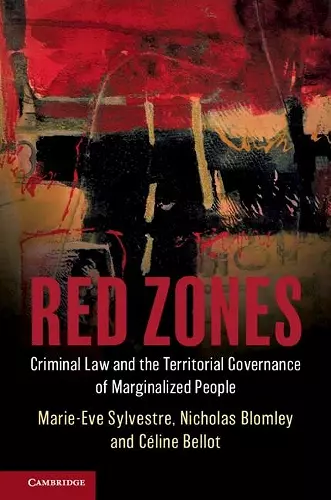Red Zones
Criminal Law and the Territorial Governance of Marginalized People
Nicholas Blomley author Marie-Eve Sylvestre author Céline Bellot author
Format:Paperback
Publisher:Cambridge University Press
Published:2nd Jan '20
Currently unavailable, and unfortunately no date known when it will be back
This paperback is available in another edition too:
- Hardback£95.00(9781107184237)

Examines the court-imposed territorial restrictions and other bail and sentencing conditions that are increasingly issued in the context of criminal proceedings.
Examines the court-imposed territorial restrictions and bail and sentencing conditions that are increasingly issued in criminal proceedings. This will interest academics in law, socio-legal studies, urban studies, geography, and criminology and be of use to policy-makers and practitioners working in criminal procedure and court reform.In Red Zones, Marie-Eve Sylvestre, Nicholas Blomley, and Céline Bellot examine the court-imposed territorial restrictions and other bail and sentencing conditions that are increasingly issued in the context of criminal proceedings. Drawing on extensive fieldwork with legal actors in the criminal justice system, as well as those who have been subjected to court surveillance, the authors demonstrate the devastating impact these restrictions have on the marginalized populations - the homeless, drug users, sex workers and protesters - who depend on public spaces. On a broader level, the authors show how red zones, unlike better publicized forms of spatial regulation such as legislation or policing strategies, create a form of legal territorialization that threatens to invert traditional expectations of justice and reshape our understanding of criminal law and punishment.
'A brilliant contribution to criminal law and criminal law theory! In their remarkable empirical and legal study on Red Zones, Marie-Eve Sylvestre and her colleagues, Nicholas Blomley and Céline Bellot, show how the quotidian forms of law's technical practices - such as bail and probation supervision - have a momentous impact on the administration of the criminal law, on punishment practices, and on our own understandings and expectations of justice. Chock full of insights about how these practices function to regulate the poor and create both spatial and temporal effects that make rights arguments and resistance far more difficult, Red Zones is a must read for anyone studying criminal law, criminal law theory, and policing.' Bernard E. Harcourt, Isidor and Seville Sulzbacher Professor of Law, Columbia University
'A huge contribution to criminology and to urban geography, this book shows, with vast amounts of data, that low-level judicial proceedings such as bail act in a dysfunctional manner by imposing unrealistic spatial prohibitions on those who most need to access services and friends in stigmatized downtown areas. The far-ranging empirical research, carried out mainly in Vancouver and Montreal, is of great relevance not only across Canada but throughout North America, since the practice of imposing 'red zones' (spatial prohibitions) through probation, parole and other lower-court and police mechanisms has become ubiquitous.' Mariana Valverde, University of Toronto
'Red Zones is a highly original and ground-breaking book that compellingly reveals how marginalized peoples are increasingly governed through territory and time via criminal law and justice processes. Its rare combination of legal theory and rich empirical data will appeal to legal scholars, criminologists and geographers alike.' Randy K. Lippert, University of Windsor
ISBN: 9781316635414
Dimensions: 228mm x 153mm x 14mm
Weight: 460g
188 pages